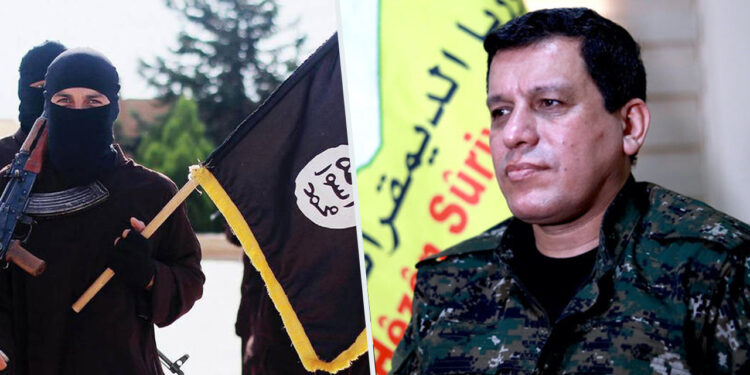Top Syrian-Kurdish Commander Mazloum Abdi interviewed on the growing threat of ISIS resurgence and the failure of the US to maintain sufficient support for northeast Syria’s local security forces in the fight against the extremist group.

A resurgence of the Islamic State (ISIS) is imminent, a top Syrian-Kurdish commander has warned, as the extremist group takes advantage of heightened security issues in the Middle East, coupled with a growing population of radicals emerging from refugee camps in the region. Moreover, the United States must commit to ‘meaningful engagement’ with the autonomous governance in northeast Syria and support the US-allied local forces in their fight against ISIS, the commander, Mazloum Abdi, said in a recent interview.
With the US focusing on Israel’s war against Gaza, ISIS is expected to up its attacks against the local Syrian Democratic Forces (SDF) and regain strength having already expanded its presence in regime-controlled areas in the Syrian desert, Abdi said. ISIS exploits vulnerabilities created by the refusal of the US to formally acknowledge the Autonomous Administration of North and East Syria (AANES) as an interlocutor in the Global Coalition Against Daesh (ISIS), despite an allegiance between the US and the SDF, the AANES’s security force.
Abdi’s interview, conducted by Al-Monitor’s Amberin Zaman, provides insight into the developing situation in the Middle East and beyond. Since the war in Ukraine began in February 2022, followed in October last year by the war in Gaza, ISIS has claimed responsibility for large-scale terror attacks, Abdi noted, pointing to a major bombing in Kerman, Iran and a theatre shootout in Moscow, Russia.
Israel’s attack on an Iranian consulate building in Damascus, last week, has further complicated the situation. Abdi said: “Daesh is exploiting the [regional] chaos to increase its attacks against us. At the same time, militias allied with Iran have also increased their attacks against us together with Syrian regime forces, particularly in Deir Ezzor.”
“Meanwhile, the regions under Turkish occupation in northern Syria — Tell Abyad, Azaz, and Idlib — provide a safe haven for Daesh,” the commander added.
Abdi said that the situation will only worsen as the regional conflict spreads. “It [escalation] would not be in anyone’s interest. But there are certain powers in the region agitating for just such an outcome.”
The economic crisis in Syria as a whole, including the autonomous northeast, also contributes to the strengthening of ISIS and the Global Coalition must address this, Abdi said.
“Unemployment is soaring and this too benefits Daesh (ISIS), making it easier for them to recruit. Hence, we ought to be receiving far more financial support from our allies. The opposite is happening. Funds are shrinking. The US-led coalition’s resolve to defeat Daesh has weakened.”
Turkey’s continuous bombardment of northern and eastern Syria which has targeted civilian infrastructure and left millions without basic amenities, further adds to the region’s vulnerability as an ISIS breeding ground, he said.
Meanwhile, the SDF struggles to keep control of the region’s refugee camps holding the families of ISIS, with insufficient support from the international arena. Al Hol Camp and Roj Camp have sheltered the wives of ISIS members and their children since ISIS was last defeated in early 2018. Tens of thousands of girls and boys have grown up in the camps and are at risk of being infiltrated into extremist ideology.
“In the detention camps here in al-Hol, in Roj, new generations of even more radical ISIS militants, boys and girls, are maturing and planning their escape,” Abdi said.








Leave A Comment